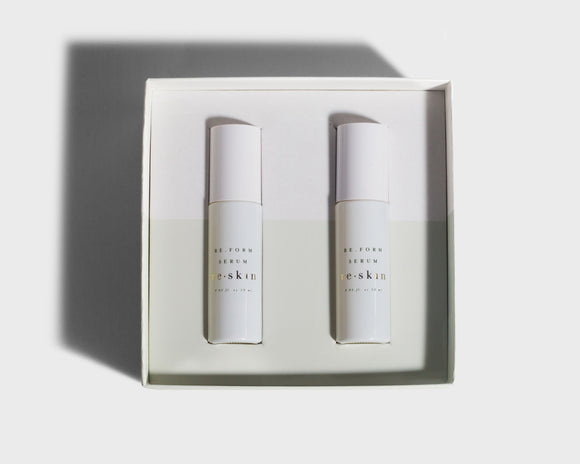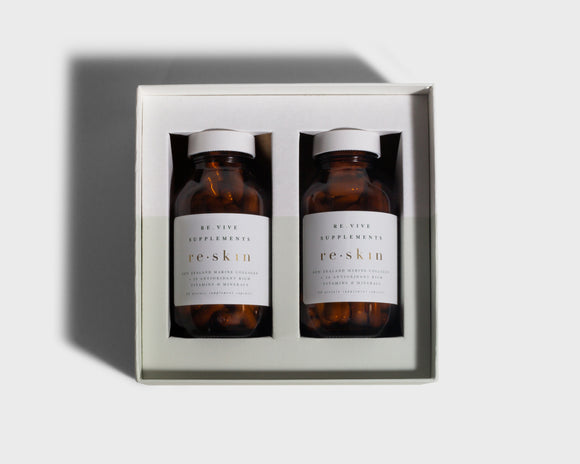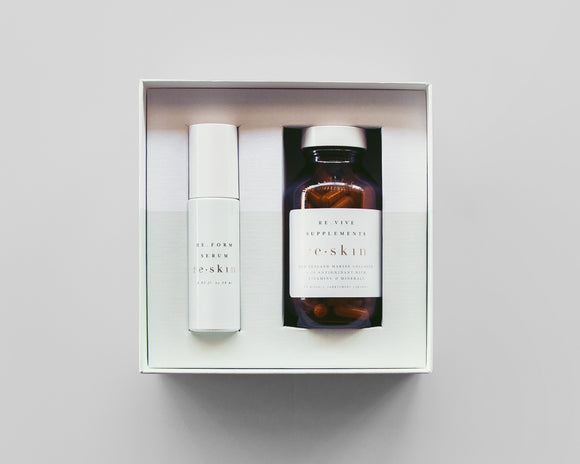
Not all collagen is created equal
You’ve seen them everywhere – from health blogs to celebrity beauty profiles – it’s arguably the most sought-after beauty product right now. Boasting anti-ageing, wound-healing and bone-strengthening properties, it’s no surprise many of us are choosing to supplement with collagen. But with chat of type 1, type 3, liquid versus powder, marine versus bovine, the message is pretty clear: not all collagen is created equal.
Below, we break down the ins and outs of taking a collagen supplement so you can make an informed decision.
What is collagen and why do we need it?
Collagen plays a number of important roles in the human body. This abundant protein is made up of amino acids which provides strength and integrity to our connective tissues, such as tendons, ligaments, and skin. Collagen can also be found in our blood vessels, gut lining, teeth, nails and the cornea of the eyes.
Collagen production starts to decline when we enter our mid-20s reducing by 1 per cent each year. By the time we’ve reached our 40s, collagen levels may have fallen by as much as 30 per cent depending on our lifestyle.
As collagen depletes, our cells lose their structure resulting in skin that is thin and weakened. Next stop: wrinkles, fine lines, dark circles, dry skin and cellulite.
The different types of collagen
Before we get into the sources of collagen, it’s important to understand how the different variations of collagen - 28 to be precise - function in the body and which ones to look out for when considering a supplement. Thankfully, there are only five ones we really need to know about.
Type I makes up almost 90 per cent of our bodies collagen and is behind the sought-after anti-ageing properties such as minimising wrinkles, cellulite and improving your skin’s health and hydration. However, all collagen is helpful in its own way: type II assists with joint health; type III is the go-to for building strong muscles, healthy organs and blood vessels; type IV is known for its wound-healing abilities, and type V is particularly important for neonatal development.
Where does collagen come from?
Collagen supplements source the various types of collagen from marine (fish), bovine (cow), porcine (pig), and chicken – here are the pros and cons you need to know.
Marine collagen: Research has found that marine collagen reigns supreme. This source of type I collagen is more efficiently absorbed into the body improving hair, skin, nail, and bone quality. The only downside is that due to the higher quality and efficacy it tends to be more expensive.
Bovine collagen: Bovine collagen from cartilage is also promoted for its beauty benefits. However - and that’s a big however - it’s important to ensure it is sourced from free-range, grass-fed, hormone-free cows which can often drive up the relatively more affordable collagen in price.
Porcine collagen: This source of collagen if from, yep, you guessed it, pigs. Due to its high accessibility, porcine collagen is one of the more affordable sources of type III collagen and some type I to support skin, hair and nails. The downside is that it’s not as effective as marine collagen.
Chicken collagen: Typically sourced from cartilage, chicken collagen isn’t ideal for anti-ageing support and has only been linked to pain relief for mobility conditions.
If you’re choosing to supplement with collagen, always do your research on where the collagen is sourced from.
What are the benefits of taking a collagen supplement?
By supplementing with collagen, you’re topping up the production of the protein responsible for skin elasticity, and healthy bones and joints. And you don’t need to wait until you’re experiencing joint pain to start. Other possible benefits include maintaining a healthy gut and weight, reducing anxiety, improving mood and promoting hair and nail growth. What’s not to love?
How should you take your collagen?
In the height of the collagen craze, this fountain of youth protein is being packed into products in every shape and form, some less validated than others. Research has found when taken orally - like a capsule - collagen supplements can improve skin hydration, elasticity and wrinkling. If you do opt for a collagen supplement, make sure you’re taking it with liquids that are leaning towards the cooler side as anything above body temperature may break it down.



